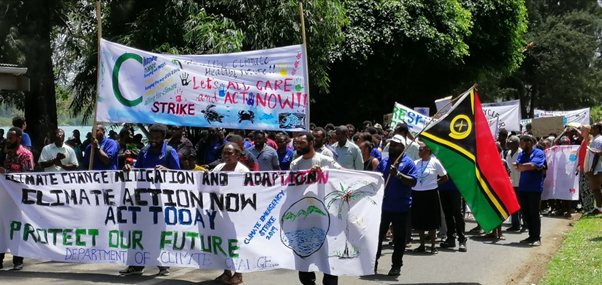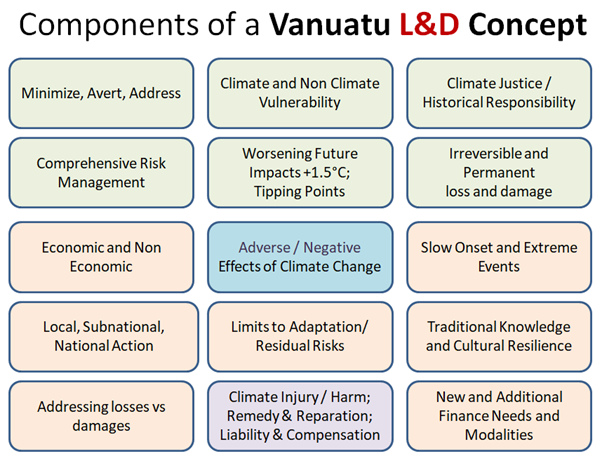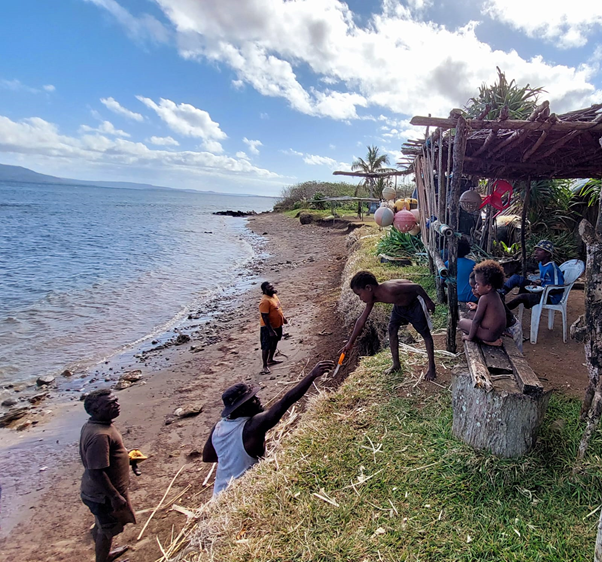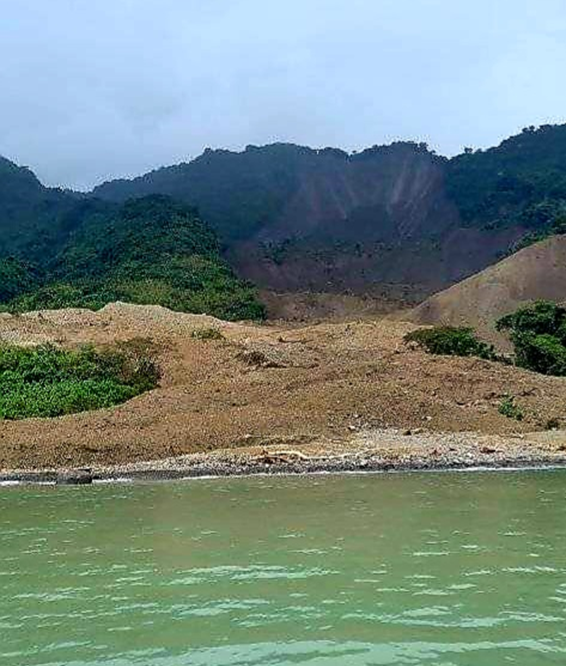Economic and Non-Economic Effects of Climate Change Loss & Damage
Vanuatu’s annualized economic losses, which include losses from intensive and extensive risk, indirect losses and slow-onset disasters is approximately 166.96 million USD per year, which represents at least 21% of GDP. Although recent climate extreme events dwarf these estimates, as single extreme events are now regularly costing more than 60% of Gross Domestic Product GDP. For example, Category 5 Cyclone Pam caused an estimated US$449.4 million of damages, equivalent to 64.1% of Vanuatu’s GDP. Category 5 Cyclone resulted in monetary disaster effects of US$617 million, corresponding to approximately 61% of GDP.
While loss and damage can often be quantified in economic or monetary terms, much of the most significant harm suffered is intangible or to systems which play no part in the market economy. Such non-economic loss and damage (NELD) in Vanuatu encompasses loss of cultural heritage, traditional knowledge, biodiversity, human health, and community cohesion. These intangible losses deeply affect the identity, well-being, and resilience of communities, particularly indigenous and coastal populations who have strong cultural and spiritual ties to their environment. Recent studies in Vanuatu published in Nature Climate Change demonstrate that climate change is impinging on the human rights of Vanuatu’s people.
Multiple crises, including extreme natural events, political instability, health issues, and community conflicts are increasingly overlapping and amplifying each other. Global interconnected trends, including climate change, population growth, militarisation and armed conflict, the expansion of artificial intelligence and political polarization are exacerbating the localised effects, which counteract Vanuatu’s development gains and progress towards social equity. The achievement of Vanuatu’s National Sustainable Development Goals is at serious risk.
Vanuatu's riskscape is transforming with compounding and cascading climate and disaster risks that diminish social and economic resilience. As sea levels rise, saltwater intrusion into freshwater resources compromises drinking water and agricultural productivity, undermining livelihoods and exacerbating food and water insecurity. Ocean acidification is damaging coral reefs, which are crucial for biodiversity, fisheries, and the tourism industry, thus threatening both the natural environment and economic stability. Prolonged droughts disrupt traditional farming practices, reduce crop yields, and increase the dependency on imported food, further straining local economies.
Vanuatu’s Historical Loss & Damage Leadership
 Vanuatu has been a leader in Loss & Damage issues from the very outset of the multilateral climate change processes. Vanuatu, as founding chair of the Alliance of Small Island States (AOSIS), put forward the concept of an International Insurance Pool to compensate low-lying islands for the loss and damage associated with sea level rise. Since that time, Vanuatu has continued to lead on loss and damage in the UNFCCC with a focus on engaging with the Warsaw International Mechanism on Loss & Damage, designing and operationalising the Fund for responding to Loss & Damage, enhancing wider loss and damage funding arrangements, expanding international cooperation, and refining policy frameworks aligned with the Paris Agreement.
Vanuatu has been a leader in Loss & Damage issues from the very outset of the multilateral climate change processes. Vanuatu, as founding chair of the Alliance of Small Island States (AOSIS), put forward the concept of an International Insurance Pool to compensate low-lying islands for the loss and damage associated with sea level rise. Since that time, Vanuatu has continued to lead on loss and damage in the UNFCCC with a focus on engaging with the Warsaw International Mechanism on Loss & Damage, designing and operationalising the Fund for responding to Loss & Damage, enhancing wider loss and damage funding arrangements, expanding international cooperation, and refining policy frameworks aligned with the Paris Agreement.
In May 2022 Vanuatu’s Parliament unanimously endorsed a Declaration of Climate Emergency , which contains critical Loss & Damage policy context.
In December 2022, Vanuatu joined with the Commission of Small Island States on Climate Change and International Law (COSIS) to make a Request to the International Tribunal for the Law of the Sea (ITLOS) on key legal questions directly related to climate-related loss and damage to our oceans, with the Tribunal’s historic ruling identifying greenhouse gasses as a marine pollutant under the convention, and advising that States indeed do have specific legal obligations outside of the Paris Agreement and UNFCCC to prevent harm (loss and damage) to the oceans.
Vanuatu led an historic initiative at the United Nations General Assembly in 2023 to request for an Advisory Opinion to the UN’s International Court of Justice seeking clarity, under International Law on the obligations of States to ensure the protection of the climate system and other parts of the environment from anthropogenic emissions of greenhouse gases for States and for present and future generations.
To prevent and disincentivise environmental loss and damage from climate change, in 2024 Vanuatu (along with Fiji and Samoa) proposed to the Assembly of States Parties to the Rome Statute of the International Criminal Court (ICC) that ecocide be formally classified as an international crime , defined as “unlawful or wanton acts committed with knowledge that there is a substantial likelihood of severe and either widespread or long-term damage to the environment being caused by those acts.”
In 2025, Vanuatu became the first country in the world to receive support from the Santiago Network on Loss and Damage to develop a funding request to the UN Fund for responding to Loss and Damage, and commenced work to establish a National Loss 7 Damage Fund to provide direct access to vulnerable communities.
A working conceptualization of Loss & Damage in Vanuatu
Under the United Nations Framework Convention on Climate Change (UNFCCC), Loss and Damage refers to the adverse effects of climate change that cannot be avoided through mitigation or adaptation. Vanuatu’s consultation draft Loss & Damage Policy Framework and Implementation Roadmap, includes the following contextual definition, with 15 core elements:

 The people of Vanuatu are experiencing increasingly severe impacts from climate change, driven by increases in greenhouse gas (GHG) concentrations which are unequivocally caused by human activities associated with fossil fuels and industry. Vanuatu and other Pacific Small Island Developing States are not responsible for climate change, and have contributed less than 0.0016% and 0.02% respectively of global historical greenhouse gas emissions.
The people of Vanuatu are experiencing increasingly severe impacts from climate change, driven by increases in greenhouse gas (GHG) concentrations which are unequivocally caused by human activities associated with fossil fuels and industry. Vanuatu and other Pacific Small Island Developing States are not responsible for climate change, and have contributed less than 0.0016% and 0.02% respectively of global historical greenhouse gas emissions.
Climate impacts can be constrained by the level of preventive action, both through reducing greenhouse gas emissions (avert risk) and by adaptation and disaster risk reduction measures (minimise risk).
Thus Vanuatu’s climate vulnerability stems from insufficient global mitigation efforts, its direct exposure to a range of climate and non-climate risks, as well as inadequate levels of action and support for adaptation provided to Vanuatu as an unfulfilled obligation of developed countries under the UN Framework Convention on Climate Change , and reaffirmed in the Paris Agreement. Taken together, Vanuatu’s climate vulnerability is one of the highest in the world.
Climate change catastrophic impacts are expected to worsen exponentially when Global warming exceeds the 1.5°C temperature threshold set by the Paris Agreement. Further warming increases the likelihood and expands the impacts of abrupt and/or irreversible changes in the climate system, making it particularly challenging to predict the impacts triggered when tipping points are reached, and earth’s critical planetary boundaries are crossed.
Comprehensive Risk Management (CRM) is an approach for managing the risk of loss and damage and addressing actual loss and damage. There are a range of actions being employed currently within Vanuatu’s territory to reduce growing climate risks. The comprehensive risk management landscape in Vanuatu includes a diverse climate adaptation and disaster risk reduction sector, which works to reduce vulnerability to climate impacts by minimising risks, building resilience and supporting communities and ecosystems adjust to changing climate conditions, a vibrant humanitarian sector which focuses on protecting lives, alleviating suffering, and providing immediate relief after climate disasters, as well as a recovery sector, which focuses on helping communities rebuild, restore and return to safe, sustainable conditions, including through medium and long-term programmes and national platforms.
It is no longer possible to prevent or minimise all climate risks as historical greenhouse gas emissions and investments into fossil fuel industries have already locked us to a certain level of climate impacts. Moreover, not all climate change impacts can be successfully adapted to, whether because of financial, technical, or physical constraints. The actions undertaken are far too little and long too late, and as a consequence climate losses and damage occur.
Climate losses and damages refer to the negative impacts of climate change, including those that are permanent, irreversible, or difficult to address due to inadequate global action o n mitigation and adaptation pathways, or due to soft and hard limits to adaptation and risk reduction.
 The harms being suffered by Vanuatu’s people, ecosystems and economy include often-irreversible and increasingly permanent impacts on goods and services with market or economic value (economic loss and damage) as well as assets which may be less tangible, quantifiable or unlinked to economic value (non-economic loss and damage) such as loss of human lives, loss of cultural heritage, health and psychosocial impacts, biodiversity and ecosystem services decline.
The harms being suffered by Vanuatu’s people, ecosystems and economy include often-irreversible and increasingly permanent impacts on goods and services with market or economic value (economic loss and damage) as well as assets which may be less tangible, quantifiable or unlinked to economic value (non-economic loss and damage) such as loss of human lives, loss of cultural heritage, health and psychosocial impacts, biodiversity and ecosystem services decline.
Moreover, climate hazards manifest at different timescales, and the speed at which impacts emerge is variable, including those which occur over hours or days (extreme events) such as tropical cyclones, extreme rainfall, meteorological drought and those which manifest over months, years of decades (slow onset events) such as sea level rise, ocean acidification and groundwater salinification.
Damage may be understood as impacts that can be repaired or restored (such as windstorm damage to the roof of a building, or damage to a coastal mangrove forest from coastal surges which affect villages). While, Loss may be understood as impacts that cannot be repaired or restored (such as loss of tuna resources due to climate-induced Northward geographic shifts, or loss of culture or heritage associated with potential population redistribution away from areas that become less habitable due to climate change).
Because the impacts of global warming manifest locally, loss and damage is realised at the lowest resolutions, but can be aggregated for analysis at sub national, national and even regional levels. Actions to address losses and damages can also be undertaken at all levels, while maintaining the principle of subsidiarity which holds that loss and damage decision-making authority should be placed where climate impacts and responsibility for outcomes will occur.
Climate loss and damage threatens indigenous traditional knowledge by disrupting ecosystems, altering ancestral lands, and undermining cultural practices that rely on specific environmental conditions, making it essential to address the loss of language, culture, customary practice and knowledge across solutions spaces. Indigenous people and communities have internationally protected rights and core capacities required to address climate impacts in a self-determined way, including through the use of Traditional knowledge.
As climate impacts become more severe, the effectiveness of adaptation strategies will diminish and loss and damage is expected to increase. Limits to adaptation are already being breached on a daily basis in Vanuatu, with communities ineffectively investing time and energy on resilience strategies that cannot withstand the climate impacts occurring now and projected to worsen in the future.
New and additional finance for loss and damage is crucial to address the growing impacts of climate change, as sectors and households face escalating costs from extreme events and slow-onset changes. Innovative and accessible financial mechanisms are required to allow direct access to vulnerable groups, and sources from diverse funding arrangements including budget allocations, concessional finance, risk transfer instruments, multilateral climate funds, bilateral support, innovative use of taxes and levies and more.
Due to the historical responsibility of polluting countries and companies, evidenced by robust attribution science, for the significant harm to the climate system and other parts of the environment, and the injury suffered by particularly vulnerable people and specially affected present and future generations, there exists a right to remedy and reparation including access to justice, restitution, compensation, rehabilitation, satisfaction, and guarantees of non-repetition. Right to remedy ensures that affected individuals or communities can seek redress through fair and accessible legal processes, obtain compensation or restitution for damages, and receive support to restore their well-being and dignity.
Taking Action to Avert, Minimise and Address Loss & Damage in Vanuatu
Vanuatu has assembled a national Working Group on Loss and Damage which is made up of experts from Government, civil society, academia, the private sector and development partners. This Group reports to the National Advisory Board on Climate Change & Disaster Risk Reduction and serves as the defacto loss and damage governance group which makes policy recommendations, designs and steers projects and sets international loss and damage negotiating positions.
Vanuatu’s leadership on the issue of Loss & Damage, a range of regional and bilateral partners have commenced support to Vanuatu on its loss and damage action ambition and aspirations. The table below highlights the initial pipeline projects (currently underway and planned) that are focused primarily on loss and damage issues.
| Project Title | Project Duration | Fiscal Volume | Implementing Entity | Donor | Key Loss & Damage Interventions | Status |
|---|---|---|---|---|---|---|
| Strengthening loss and damage response capacity in the Global South (STRENGTH) | 36 months 2023-2025 | 96,000 British Pounds (~14,500,000 VUV) |
Vanuatu Department of Climate Change International Centre for Climate Change and Development (ICCCAD) Institute for Study and Development Worldwide (IFSD) |
Canada’s International Development Research Centre (IDRC) | Support the development of country-level loss and damage policy and implementation mechanisms, founded on collaborative research. • critical review of documented knowledge • country-level diagnostic studies and pilot actions • dialogues and knowledge exchange forums |
Underway |
| Pacific Island Countries access to and absorption of Climate Finance | 2023-2025 | In Kind; Technical Assistance ~US$ 400,000 |
Ministry of Climate Change Global Green Growth Institute (GGGI) |
United Kingdom Small Island Developing States Capacity and Resilience Programme (SIDAR). | A range of support services, including: • Development of Loss & Damage Policy Framework and Implementation Plan • Long-term technical advisors to strengthen institutional capability to access, absorb and deliver impactful climate finance, • Strategic feasibility studies to strengthen climate finance implementation and knowledge sharing |
Underway |
| Addressing Climate Change Loss and Damage in the Pacific | To commence in 2025 two years |
4 million NZD | Ministry of Climate Change Tonkin & Taylor |
New Zealand | Pacific Island Countries are supported and prepared to address the loss and damage they are experiencing due to climate change. • Assessment of L&D requirements • Establishment of L&D fund/funding window • Development of project pipeline • Capitalisation of fund/funding window |
Underway |
| Development of a long-term nationally determined programme to address loss and damage in the Republic of Vanuatu under the Santiago network | To begin Q1 2025 | US$ 330,000 | OBNE to be selected by the SNLD Secretariat | Santiago Network on Loss and Damage | Capacity and L&D Finance Planning • National loss and damage visioning • Assessment of loss and damage capacity development needs • Approaches and methodologies for knowledge management, capacity building and communication • Request to the Fund for responding to Loss and Damage |
Call for proposals currently open |
| Building Our Pacific Loss and Damage Response (BOLD Response) Project | To begin in 2025, 5 years | 19.7 mil € EUR shared among regional work, and in Marshall Islands, Samoa, Tuvalu, Vanuatu | Secretariat of the Pacific Regional Environment Programme (SPREP) Climate Analytics Australia-Pacific |
German International Climate Initiative (IKI) | Build capacities to address Loss & Damage in the Pacific • Scientific basis for L&D Policies • Measuring non-economic loss and damage • Inclusion of L&D in national and regional Policies • Climate finance for loss and damage |
Planning Stages |
Contact Details: for more information on Vanuatu’s Loss & Damage priorities, contact the DoCC on 22160 and:
Mr. Brian Maltera
+678 5214506
Dr. Christopher Bartlett
+678 5552187


